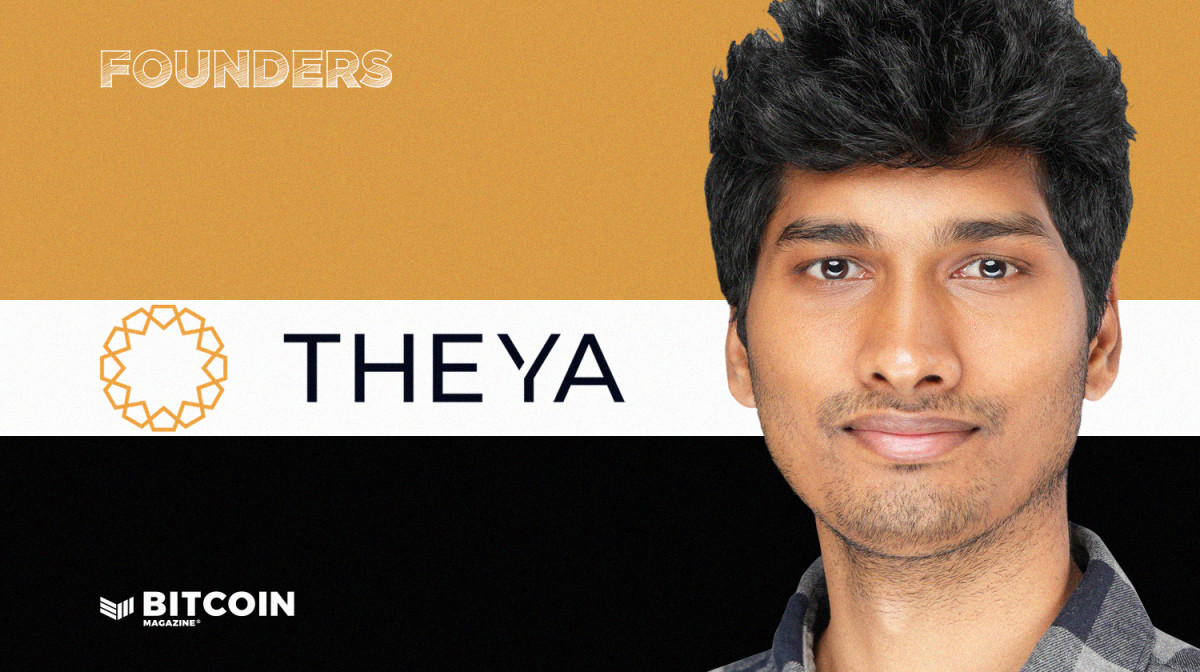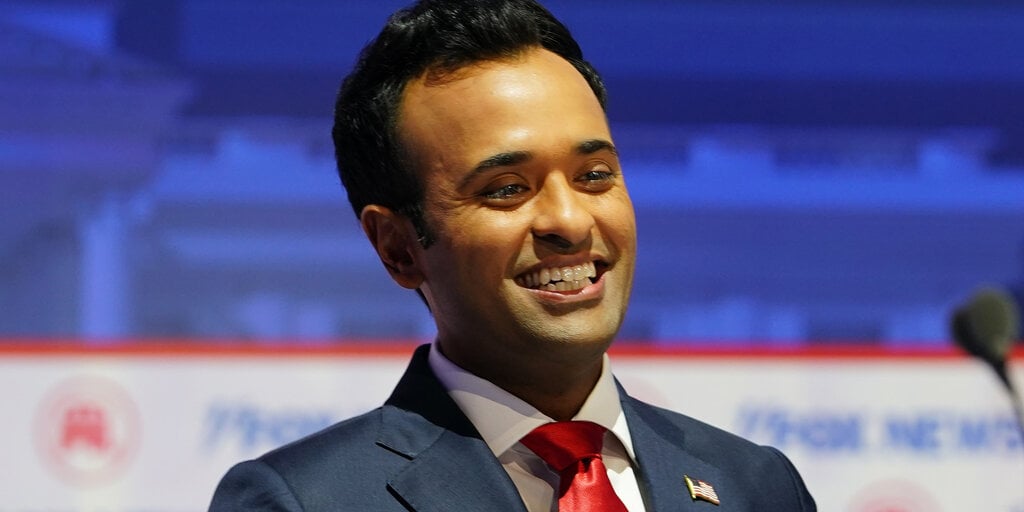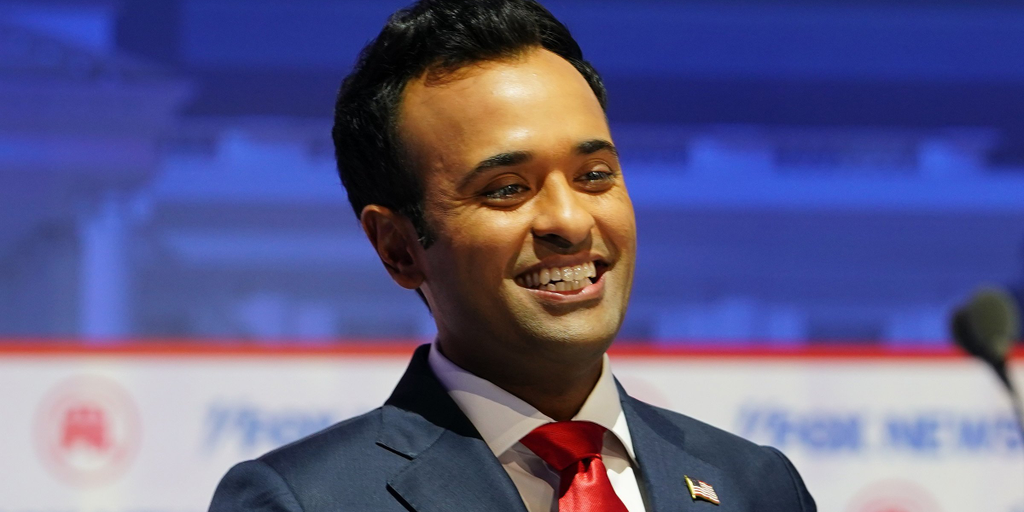business
Google, Robinhood Veteran Aims To Bring Bitcoin Multsig To The Masses With Theya
Published
3 months agoon
By
admin

Company Name: Theya
Founders: Sriram Bhargav Karnati, Smeet Bhatt and Vikas Choudhary
Date Founded: December 2022
Location of Headquarters: San Francisco, CA
Amount of Bitcoin Held in Treasury: “It’s significant.”
Number of Employees: 7
Website: https://www.theya.us/
Public or Private? Private
Sriram Bhargav Karnati believes that top-notch security and usability are not mutually exclusive when it comes to managing your bitcoin.
So, he and his co-founders at Theya have built a multsig bitcoin vault — a mechanism that requires multiple participants to sign off on a Bitcoin transaction — that users can conveniently manage from their mobile devices.
“Our mission is to make self-custody easy for everybody,” said Karnati.
“If you look at all the $1 trillion companies — all the big tech companies: Apple, Google, Facebook — they all have brilliant products that everyday people can use. But if you look at Bitcoin, you don’t have a product that’s super easy for everybody to use without having to become a security engineer or have technical expertise,” he added.
“[We] want to really make it super simple to onboard people and make long-term storage super convenient.”
Combining Karnati’s background in building consumer products for major companies like Google and Robinhood with his deep understanding of Bitcoin, it seems there’s perhaps no better person for the job of bringing multisig Bitcoin vaults to the masses.
A Silicon Valley All-Star Shifts To Bitcoin
Growing up in Bombay, Karnati dreamed of working in Silicon Valley.
He got the opportunity in 2014 when he began working at Google, where he contributed to a number of the company’s products.
“At Google, I didn’t work on just one team,” recounted Karnati.
“I touched almost all products that you use: Google Search, Google Shopping, Google Ads — everything,” he added.
“My biggest lesson from that was ‘How do you build the system from the ground up and scale it to billions of users?’ And also ‘How do people think about using a product?’”
By 2021, Karnati found himself at another prominent Bay Area-based tech company, Robinhood.
At Robinhood, Karnati learned about the intersection of money, finance and technology, paying close attention to what the company got right when it came to user experience.
“When I worked at Robinhood, one of my biggest lessons was ‘How do you take complex financial instruments and make them super simple?’” explained Karnati. “[We were] basically giving access to everybody to join finance.”
Karnati has taken these lessons he learned in Silicon Valley and is now applying them to Bitcoin self-custody.
He knows that if Bitcoin is going to scale the way it was intended to — with users holding bitcoin in self-custody — then it has to become easier to use a non-custodial bitcoin wallet or vault.
Enter Theya — dynamic and secure solution to bitcoin self-custody.
How Theya Works
Theya’s vaults employ a 2-of-3 multsig setup, which means that two of the three private key holders have to sign off on sending bitcoin from the vault for the transaction to occur. Theya holds one of the keys while the user(s) hold the other two.
What’s unique about Theya is that its first multisig solution that doesn’t require the use of a hardware wallet — devices that Karnati believes are intimidating to newer bitcoin users.
“Mobile multisig is for people who don’t have a hardware wallet, but still want to do self-custody with more than a single-sig [device],” explained Karnati.
“You can create a family wallet with you and your spouse. That type of product didn’t exist before Theya,” he added.
“[They can] get started with multisig, and, as they accumulate more and more bitcoin, they can slowly upgrade to a hardware wallet and create a cold storage [setup].”
For this service, Theya charges an annual fee of $199.
That said, Karnati and the team at Theya are aware that not everyone is going to opt for a multisig setup right away, especially one that comes with a price tag attached.
Given Theya’s mission to onboard as many people to self-custody as possible, Karnati explained that Theya provides a free non-custodial wallet option, as well.
“The single-sig mobile wallet is free,” he said, “and you can create as many wallets as you want.”
Karnati added that the free single-sig offering is also compatible with hardware wallets. For example, you can use the Theya app as an interface for any of the hardware wallets it supports — including Ledger, Trezor, ColdCard and Foundation devices.
But who would invest in a company that gives part of its product away for free in efforts to fulfill its mission?
One of the most prominent venture capital (VC) firms in the broader crypto and tech space — Y Combinator — that’s who.
Why Y Combinator?
To get Theya off the ground, Karnati and his co-founders accepted funding from Y Combinator, well-known for helping to financially accelerate startups in the broader crypto space — startups that often issue their own crypto tokens — as opposed to Bitcoin-only startups.
So what piqued Y Combinator’s interest in Theya?
“Y Combinator doesn’t really invest based on the idea,” said Karnati. “They invest based on the founder’s background.”
Given that Theya’s two other founders — Smeet Bhatt and Vikas Choudary — also have impressive résumés and extensive experience working in tech, logistics and finance, it isn’t hard to imagine why Y Combinator was interested.
However, Y Combinator appreciated more than just the backgrounds of Theya’s founders.
“They also love our mission,” said Karnati.
“There’s a clear space for us to build. Everybody wants to make quick money. Everybody wants to create a token and stuff like that, and they thought ‘These guys are doing something different and filling a gap where you don’t really have big products,’” he added.
Karnati’s Bitcoin Conviction
Considering that Karnati has the chops as a developer to work for seemingly any technology company, one has to ask: Why focus on Bitcoin?
“I read Satoshi’s whitepaper in 2014 and kind of understood it,” Karnati recalled. “Then, I read Andreas’ Mastering Bitcoin to understand better how it works.”
But it wasn’t Karnati’s theoretical grasp on Bitcoin that made him a believer.
“Then, I bought a little bit of Bitcoin and made a transaction on-chain,” he said.
“That’s when I was like, ‘Wow, like this is real.’ I was able to move my own money permissionlessly. It was so obvious that this has to be the future of money,” he added.
When Karnati juxtaposed this experience in transacting with bitcoin with his experience in sending international remittances from South Korea, where he lived while working for Samsung, to India he experienced one of Bitcoin’s main value propositions — cheap and fast remittances.
“There was a lot of KYC, a lot of verification and it was super slow,” said Karnati of the process of sending a remittance payment via the traditional financial rails. “Sometimes there were some failures, as well, and it was very costly — there was a 1.5% fee on top of foreign exchange fees.”
After this experience, Karnati also learned about and experimented with other blockchains, only to come back to Bitcoin once he became more fully aware of one of bitcoin’s other main attributes — a store of value.
“I realized the most important thing is the store of value,” said Karnati regarding what separates bitcoin from other digital assets.
This is part of what prompted him to create a product that made storing the private keys to that store of value easier and safer.
What’s Next For Theya?
Aside from providing users with a premier multisig vault experience, Karnati and the team at Theya have further aspirations for their app.
“Payments is definitely an area into which we want to grow,” said Karnati. “We want to make it easy for merchants to accept payments and for someone to offer a subscription service.”
However, he added that integrating Lightning isn’t next on the docket for Theya.
Karnati and his team are more intent right now on introducing an exchange into the app so that users can purchase bitcoin within the app and send it directly to cold storage. Part of his motivation for including such a feature comes from taking note of the shortcomings of other Bitcoin and crypto exchanges in the space, including one for which he used to work — Robinhood.
“Some of our users have a Coinbase or Robinhood account,” explained Karnati.
“[These platforms] have limits to withdrawals, which is a hassle for [users]. With what we’re making, you can buy directly to the self-custodial vault,” he added, proving the point that convenience and top-notch security can co-exist in one app.
Source link
You may like


Six leading meme coins set to skyrocket in 2024


Bitcoin-focused NiceHashX Conference Happening This Week


Mt. Gox Moves $2.2 Billion in Bitcoin Following Repayment Timeline Extension


Investors look towards Lunex Network for gains ahead of Toncoin and Solana


BTC Wanes To $68K, Altcoins Flux, & DOGE Up 6%


MANTRA partners with Libre Capital to facilitate tokenized money market funds
business
Crypto Fundraising Platform Legion Taps Blueprynt to Foster MiCA-Compliant ICOs in EU
Published
20 hours agoon
November 4, 2024By
admin

Crypto fundraising platform Legion announced Monday that it has teamed with startup Blueprynt to add compliance solutions that enable developers in the EU to comply with MiCA rules when conducting token sales—without relying on a slew of lawyers.
Blueprynt founder and CEO Chris Brummer told Decrypt in an interview that the partnership centers on driving down compliance costs. Whether it’s drafting white papers in a proper format, or coloring them in with on-chain data, he described Blueprynt as an end-to-end solution.
“My goal has been to free up entrepreneurs to concentrate on their vision and put their capital toward its best use,” Brummer said. “Blueprynt is basically developing software to translate regulatory requirements into a very user-friendly process.”
While white papers have a long-standing history in settings such as academia, they’ve become a staple for developers explaining how their projects work in the crypto space. At the same time, Brummer, a Georgetown University Law professor, said that white papers can serve as a means of developing investor interest, with varying degrees of accuracy or attention to detail.
Under Markets in Crypto-Assets Regulation (MiCA) rules in the EU, white papers became a requirement for projects selling tokens or raising capital as of June, with a robust set of disclosure requirements and minimum standards. For small projects, Brummer said that the costs associated with producing a compliant white paper can become prohibitive, easily pushing upwards of €50,000 (about $54,000).
Blueprynt aims to streamline the process of extracting and formatting on-chain data, creating white papers that can be reviewed by lawyers on an accelerated basis. Brummer estimated that the cost of complying with MiCA was reduced through Blueprynt by 70% in practice.
Founded in 2021, Legion aims to provide retail investors with better access to on-chain fundraising efforts. Effectively, it’s putting a regulatory compliant spin on Initial Coin Offerings (ICO), first popularized by Ethereum in 2016, alongside billions thrown at other projects.
Last week, Legion unveiled an investor scoring system, enabling founders to assess prospective investors’ contributions to other projects. Alongside the tie-up with Blueprynt, Legion founder Matt O’Connor said that the fundraising platform is further democratizing on-chain raises.
“Today’s market is full of projects that are capital rich, but community poor,” he said in a statement. “With MiCA-compliant white papers and a licensed platform for retail investors, teams can now include value-add users at the earliest fundraising stages.”
In the U.S., ICOs are largely unregulated, while the Securities and Exchange Commission (SEC) has called upon token issuers to come in and register. Carrying the risk of litigation, Brummer described the process of issuing tokens in the U.S. as a high-stakes scenario.
“It’s not easy,” he said. “The requirements that are in place don’t always fit the instrument, and that does neither regulators nor investors very much good.”
While the registration process in the U.S. could ask projects about their corporate governance, it doesn’t cover decentralized governance through DAOs. Additionally, audited financial statements could be an area of focus, while core crypto aspects like tokenomics aren’t.
Depending on whether digital assets regulation is passed following the U.S. presidential election, as some lawmakers have promised, regulatory requirements could shift soon. Meanwhile, Brummer described standardized white papers as a nod to crypto’s roots in the EU.
“They’re are many different ways in which information provided by projects will be coming under some kind of regulatory oversight,” Brummer said. “We started with the white paper because it was a great sort of proof-of-concept—the Europeans have been very forward-looking.”
Edited by Andrew Hayward
Daily Debrief Newsletter
Start every day with the top news stories right now, plus original features, a podcast, videos and more.
Source link
business
Bitcoin Is Surging—So Why All the Crypto Layoffs?
Published
3 days agoon
November 2, 2024By
admin

The American crypto industry had plenty to celebrate this week: Bitcoin came within inches of reaching its all-time high price, crypto ETFs rang in new milestones on Wall Street, and next week’s presidential election appears poised to boost the ecosystem regardless of who wins.
You’d hardly notice, then, that it was one of the worst weeks ever for America’s top crypto employers. On Tuesday, Ethereum software giant Consensys laid off 20% of its global workforce. Hours later, DYdX, a New York-based decentralized crypto exchange, cut its team by 35%. The next morning, Kraken, one of America’s largest crypto exchanges, slashed its headcount by 15%.
Rounding out the week, Coinbase reported a disappointing Q3 that missed targets, and an overall decline in customer activity. What gives?
Experts told Decrypt a multitude of factors may be at play—ranging from shorter term election- and regulation-related anxieties that may resolve soon, to more existential issues concerning the place for crypto-native companies in an industry increasingly populated by traditional finance giants.
“This is definitely the most bearish bull market of all time,” Alex Tapscott, managing director of digital assets at Ninepoint Partners, told Decrypt.
While rosy headlines about crypto’s rising tides may appear omnipresent, that narrative really only pertains to Bitcoin, which is more than ever “in a league of its own,” Tapscott said.
And even Bitcoin’s strength is no longer necessarily the crypto industry’s gain.
“Yeah, Bitcoin’s price went up a lot, but where did that inflow go?” Owen Lau, a senior analyst at investment firm Oppenheimer & Co., told Decrypt. “It’s going into traditional finance companies, as opposed to crypto-native companies.”
With Wall Street titans like BlackRock scooping up billions of dollars worth of Bitcoin trades through its exchange-traded fund thanks to brand trust and rock-bottom fees, crypto exchanges like Coinbase and Kraken are getting left out in the cold, Lau said. Companies tied to sagging cryptocurrencies like ETH—such as Consensys—are faring even worse, he added. (Disclosure: Consensys is one of 22 investors in Decrypt, which is editorially independent.)
Fears related to regulatory uncertainty and the looming presidential election may also be playing a substantial role in chilling crypto activity and investment—at least for the moment.
Kristin Smith, CEO of the Blockchain Association, a leading crypto lobbying group, told Decrypt that while she is optimistic that both a Trump and Harris administration look poised to bring regulatory clarity and support to crypto, the current U.S. Security and Exchange Commission’s hostility to the industry has done substantial damage to business that won’t be remedied until next year at the earliest.
“A lot of the capital, I think, is sitting on the sidelines, and is nervous about coming into this space until they see some more clarity,” Smith said. “So I do think the regulatory issues and the political issues are a big factor in all of this.”
Earlier this week, the Blockchain Association launched an initiative to track how much money leading crypto firms have spent on lawsuits initiated by the SEC. It says that figure is already in excess of $400 million. On Tuesday, when Consensys announced it would lay off 20% of its staff, the company’s CEO, Joe Lubin, said the staff cuts were linked to the “many millions of dollars” Consensys has spent defending itself against the SEC in court.
And yet, some experts insist crypto’s woes won’t fade away even if the U.S. government embraces the industry. Oppenheimer’s Lau thinks the current landscape of crypto-native companies—particularly centralized exchanges—is much too overcrowded, and that many such companies will end up either dying out or getting acquired by traditional finance firms.
“I don’t know why the market would allow 200 exchanges in the world,” he said. “It doesn’t make sense to me.”
Ninepoint’s Tapscott, meanwhile, thinks it’s going to take a lot more than getting rid of SEC Chair Gary Gensler to unleash a true crypto bull market.
“It’s not just the election,” he said. “If you look at previous cycles, there’s always been some set of new applications or capabilities that got people really excited.”
Tapscott points to the landmark innovations of decentralized applications (dapps) or NFTs, both of which propelled crypto markets to then-unprecedented highs.
“This time around, is there something that has galvanized people in quite the same way?” he said. “I think the answer is, not yet.”
While the prospect of politicians and Wall Street embracing crypto is certainly exciting, Tapscott added, that development has not been sufficient to kickstart a true industry-wide bull run—and can’t replace the zeal generated by a bonafide new use case for blockchain tech.
“How do you do something with the technology that wasn’t possible before?” he said.
Daily Debrief Newsletter
Start every day with the top news stories right now, plus original features, a podcast, videos and more.
Source link
business
Trump Advisor Vivek Ramaswamy Adds Bitcoin to $1.7 Billion Asset Management Firm
Published
4 days agoon
November 1, 2024By
admin

Strive Asset Management, a financial services firm co-founded by former Republican presidential candidate Vivek Ramaswamy, said Friday that it’s embracing Bitcoin in Texas.
Managing $1.7 billion in assets, the company said in a press release that a core part of its business moving forward will be “integrating Bitcoin into standard portfolios of everyday Americans,” as its headquarters relocates to the Lone Star state from Ohio.
Part of Strive’s new wealth management business, the firm cited “unsustainable global debt levels, rising fixed income yields, long-run inflationary pressures, persistent geopolitical pressures, and potential restrictive monetary controls” as factors making Bitcoin a valid hedge.
Meanwhile, Strive announced that it had completed a $30 million Series B round led by Cantor Fitzgerald. Serving as a campaign surrogate for former President Donald Trump, Ramaswamy had been a vocal crypto supporter before exiting the 2024 race, while Cantor Fitzgerald Chairman and CEO Howard Lutnick has co-chaired Trump’s transition team.
“The moment is now ripe to launch a pro-capitalism wealth management business focused on true financial freedom, with a focus on integrating Bitcoin into standard portfolios,” Ramaswamy said in a statement, pointing to shifts in environmental, social, and governance (ESG) attitudes.
With four days until Election Day, Ramaswamy’s firm is aligning itself with elements of a so-called Trump trade. Because the Republican candidate has made several overtures to crypto owners this year, analysts believe crypto prices could benefit from Trump’s reelection. In September, for example, analysts at Bernstein said Bitcoin could hit $90,000 if Trump wins the White House.
According to Fox Business, Strive is an “anti-woke” investment company, with other backers tied to the Republican ticket. Narya Capital, which invested in Strive’s Series B round, was co-founded by Trump running mate and Ohio Senator JD Vance in 2020.
Leveraging experience from the brokerage firm Sanford C. Bernstein, Strive said Gary Dorfman will helm Strive’s new business as president. Randol Curtis, formerly deputy chief investment officer at One Capital Management, will meanwhile serve as the business’s CIO.
Earlier this year, Ramaswamy spoke at a Bitcoin conference in Nashville where Trump promised to turn America into a “Bitcoin superpower.” Prior to that, Ramaswamy said that he would implement a “comprehensive crypto policy framework” if elected commander-in-chief.
Earlier this month, Vice President Kamala Harris adopted a pro-crypto stance, signaling that she would support a regulatory framework for digital assets. The pledge was predicted by Ramaswamy, who wrote on Twitter (aka X) in July after Trump’s speech in Nashville that she’ll be forced to come up with a “policy framework to pander to pro-crypto voters.”
Edited by Andrew Hayward
Daily Debrief Newsletter
Start every day with the top news stories right now, plus original features, a podcast, videos and more.
Source link

Six leading meme coins set to skyrocket in 2024

Bitcoin-focused NiceHashX Conference Happening This Week

Mt. Gox Moves $2.2 Billion in Bitcoin Following Repayment Timeline Extension

Investors look towards Lunex Network for gains ahead of Toncoin and Solana

BTC Wanes To $68K, Altcoins Flux, & DOGE Up 6%

MANTRA partners with Libre Capital to facilitate tokenized money market funds

Crypto’s Big Trump Gamble Is Risky

Why Dogecoin May Benefit Most From A Donald Trump Victory

The US Should Establish A Strategic Bitcoin Reserve

Fairshake discloses $78m crypto donation war chest

Q2 Bitcoin Mining Costs Spike To Nearly $50K

Hamster Kombat Price Risks $0.001 Breakdown Amid Massive User Exodus?

PAID IN BITCOIN: BTCPay Documentary Showcases Bitcoin as the Medium of Exchange at Bitcoin 2024 Conference in Nashville

Ethereum ETFs see $10m patronage from Michigan State

US Treasury Adds $104,000,000,000 To National Debt in One Day As Total Outstanding Debt Shatters Record High at $35,951,000,000,000
182267361726451435

Top Crypto News Headlines of The Week

Why Did Trump Change His Mind on Bitcoin?

New U.S. president must bring clarity to crypto regulation, analyst says

Ethereum, Solana touch key levels as Bitcoin spikes

Bitcoin Open-Source Development Takes The Stage In Nashville

Bitcoin 20% Surge In 3 Weeks Teases Record-Breaking Potential

Ethereum Crash A Buying Opportunity? This Whale Thinks So

Will XRP Price Defend $0.5 Support If SEC Decides to Appeal?

Shiba Inu Price Slips 4% as 3500% Burn Rate Surge Fails to Halt Correction

‘Hamster Kombat’ Airdrop Delayed as Pre-Market Trading for Telegram Game Expands

Citigroup Executive Steps Down To Explore Crypto

Washington financial watchdog warns of scam involving fake crypto ‘professors’
Mostbet Güvenilir Mi – Casino Bonus 2024

Bitcoin flashes indicator that often precedes higher prices: CryptoQuant
Trending

 2 months ago
2 months ago182267361726451435

 24/7 Cryptocurrency News3 months ago
24/7 Cryptocurrency News3 months agoTop Crypto News Headlines of The Week

 Donald Trump3 months ago
Donald Trump3 months agoWhy Did Trump Change His Mind on Bitcoin?

 News2 months ago
News2 months agoNew U.S. president must bring clarity to crypto regulation, analyst says

 Bitcoin4 months ago
Bitcoin4 months agoEthereum, Solana touch key levels as Bitcoin spikes

 Opinion4 months ago
Opinion4 months agoBitcoin Open-Source Development Takes The Stage In Nashville

 Bitcoin3 months ago
Bitcoin3 months agoBitcoin 20% Surge In 3 Weeks Teases Record-Breaking Potential

 Altcoins3 months ago
Altcoins3 months agoEthereum Crash A Buying Opportunity? This Whale Thinks So


